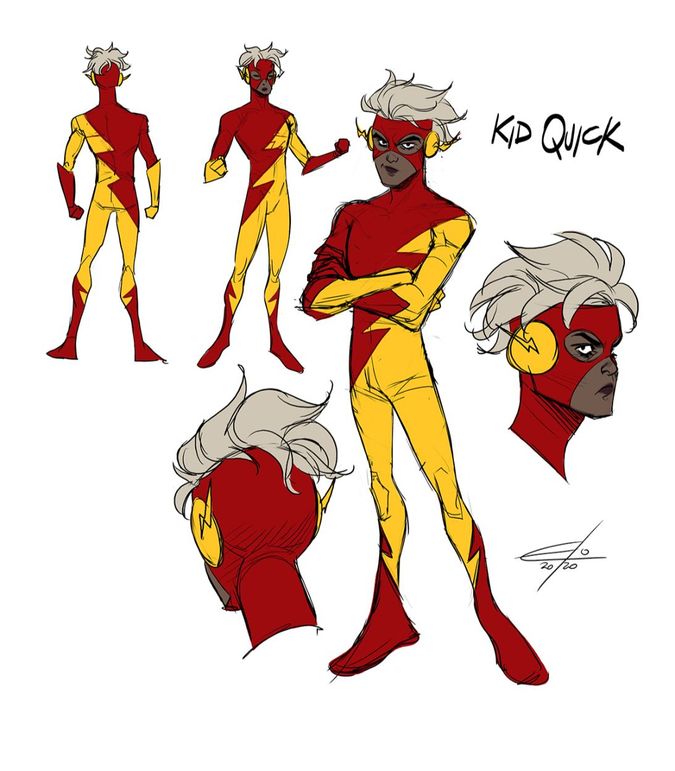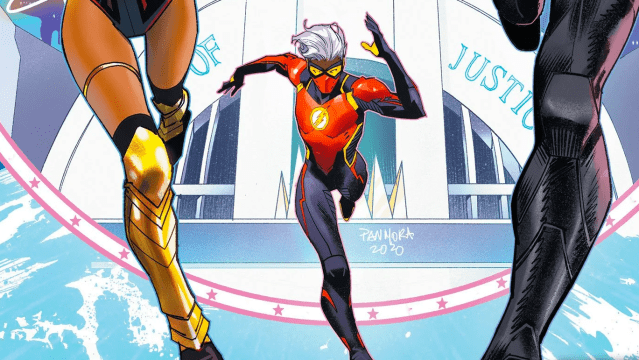In the new year, DC Comics’ focus will turn to Earth’s future in its Future State line of books, featuring new incarnations of classic heroes who are all committed to fighting the ever-present forces of evil spread across the universe. In addition to turning characters like Jonathan Kent into fully realised versions of themselves, Future State is also slated to introduce wholly new heroes like Jess Chambers, the newest speedster to take on the Flash moniker.
But before Jess becomes the newest Flash, they’re set to make their debut in DC’s Very Merry Multiverse, a holiday-themed special featuring one-shots focused on various DC characters doing their damndest to be their most festive selves. Writer Ivan Cohen and artist Eleonora Carlini’s specific story introduces Teen Justice, a new team hailing from Earth-11 where teams of younger heroes aren’t commonplace the way they have been on parallel Earths.
In an interview with Screen Rant, Cohen went into detail about how, aside from featuring mostly gender-swapped versions of classic heroes from DC’s prime universe, Earth-11’s history maps relatively cleanly onto that of the publisher’s mainstream continuity. But in the case of the Flash, DC wanted to go beyond simply presenting a female analogue to Barry Allen and his protégés. Rather than leading with Barry Allen, it’s established from the jump that Jesse Quick is Earth-11’s most iconic Speedforce user, and her familial connection to Jess, who is non-binary, is what leads to them becoming “Kid Quick” and joining Teen Justice.

“A Titans-type team always has a super-fast member, but there are so many Flash characters in the DC Multiverse, we knew anyone we added to that category had to be really different from the rest: not just Wally West with curves,” Cohen said. “I suggested that Kid Quick could be Earth-11’s first genderfluid character, and once editors saw Eleonora Carlini’s terrific take on the character design, there was suddenly a lot of interest in them for stories beyond the Merry Multiverse Special in December.”
Jess following in their aunt’s sizzling footsteps to become the world’s next A-list speedster is the sort of move that, beyond making Future State sound like an interesting line to get into, speaks to DC’s avowed commitment to making its titles more effectively reflect the diversity of its readership. The prospect of DC publishing comics in which these definitive iterations of Wonder Woman, the Flash, and potentially even Batman are all people of colour is worth taking note of because of the publisher’s storied history of primarily focusing on white and white-presenting characters. But at the same time, the important question to keep in mind as Future State’s launch grows closer is what will become of characters like Jess Chambers in the long term.
It’s easy enough to generation buzz and garner attention by rolling out a flashy (apologies,) new character and letting them play around in the narrative sandbox for a while before they effectively fade into the background, never really to be seen again. Future State being set in, well, the future, keeps the line at something of a distance from DC’s core comics series set in the publisher’s present, where much of its old status quo is still in effect. Were DC to maintain the Future State series going forward, there’s a chance that characters like Jess Chambers could end up becoming more than flashes in the pan meant to goose sales. Whether that’s the direction the company wants to go, though, remains to be seen.
Kid Quick kicks off their comics career in DC’s Very Merry Multiverse on December 9.
